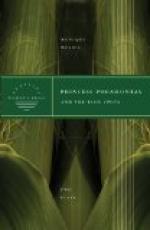“Come with me about the town and answer more of my questions. I have stored away as many as a squirrel stores nuts for popanow—what keeps the ship from floating with the tide down to the great water? Why doth that man sit with his legs before him?”—and she pointed to a carpenter who had been imprisoned in the stocks in punishment for theft—“And why?”—...
And Rolfe found himself kept as busy as Mr. Squirrel himself in cracking her questions for her.
She soon got over her awe of the white men, judging, now that she had a closer view of them, that they were in many ways like her own people. And seeing that her lightheartedness was pleasant to them, she teased and joked with them.
“Wilt thou eat a persimmon?” she asked Rolfe, smiling at the trap she was laying as she stood on tiptoe to pick one from a branch above her. And Rolfe bit into the golden fruit, not knowing that the persimmon till ripened by frost is for the eye only. She laughed with glee as she saw his mouth all puckered up until he believed it would never unpucker again.
“I’ll pay thee for this some day,” he threatened in mock anger as soon as he could speak; but she only laughed the more.
One of the reasons that Pocahontas was content to remain in Jamestown was that she hoped to get news of Captain Smith’s return. Every day she would ask, sometimes Mistress Lettice, sometimes Sir Thomas Dale, or anyone with whom she spoke:
“When cometh back the Captain? I am longing to see my Brother.”
And one told her one thing, one another, some lying because it was easier; some from sheer ignorance said they had heard that John Smith had gone back to fight the Turks; that he grew fat and lazy in his English home; that he was exploring further up the coast; that he might be expected at Jamestown with the next ship. And Pocahontas, believing those who said the last because she wished this to be the truth, was not unhappy to wait among strangers that she might be the first to welcome him.
The spot in the town which most excited her curiosity was the church. The colonists had now replaced the first rude hut by a substantial building with a tower. The bells that called Jamestown to daily prayers had a weird fascination for the Indian girl. They seemed to speak a language she could not understand. Nor could she understand the ceremony which she observed, wide-eyed, of the kneeling men and women and the white-robed clergyman who stretched out his arms over them.
“What doth it signify?” she queried; and Rolfe, remembering that the conversion of the heathen was one of the reasons given by Europe for sending colonies to the New World, tried to explain the mysteries of his faith to her. But he found it too difficult a task, and besought the Reverend Thomas Alexander Whitaker to undertake it in his stead.




